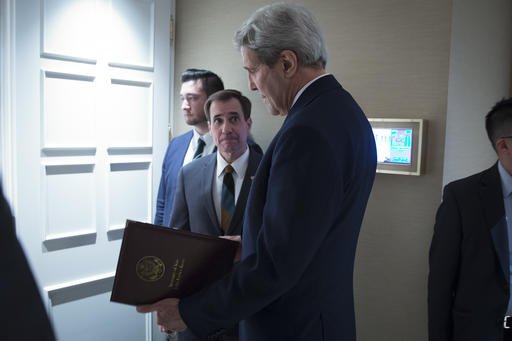-
Tips for becoming a good boxer - November 6, 2020
-
7 expert tips for making your hens night a memorable one - November 6, 2020
-
5 reasons to host your Christmas party on a cruise boat - November 6, 2020
-
What to do when you’re charged with a crime - November 6, 2020
-
Should you get one or multiple dogs? Here’s all you need to know - November 3, 2020
-
A Guide: How to Build Your Very Own Magic Mirror - February 14, 2019
-
Our Top Inspirational Baseball Stars - November 24, 2018
-
Five Tech Tools That Will Help You Turn Your Blog into a Business - November 24, 2018
-
How to Indulge on Vacation without Expanding Your Waist - November 9, 2018
-
5 Strategies for Businesses to Appeal to Today’s Increasingly Mobile-Crazed Customers - November 9, 2018
USA says $400M to Iran was contingent on release of prisoners
On Thursday, the State Department’s spokesman, John Kirby, said the USA used the $400 million as “leverage” to address concerns Iran might renege on the release.
Advertisement
The top GOP leadership and the Trump Campaign was quick to make a political capital out of it by claiming that this was nothing but ransom payment, which has finally been acknowledged by the Obama Administration.
However, Kirby said that the USA withheld the cash delivery until Iran made good on its promise to release the prisoners. “We were completely open with everybody about it and it is interesting to me how suddenly this became a story again”, he said, seeming to wag a finger at the press for daring to question the obvious.
The cash transfer and the release of the hostages – both on January 17 – came at the same time as Iran’s deal with the United States and five other world powers restraining Tehran’s development of nuclear weapons, along with the lifting of sanctions that had hobbled Iran’s economy.
The president also said the notion of paying a ransom to Iran in that manner, and so publicly, “defies logic”.
Following the deposing of the Shah of Iran, so called Iranian students stormed the US embassy and held hostage 66 diplomats and USA citizens.
“We would not, we have not, we will not, pay a ransom to secure the release of USA citizens”, Earnest said.
Administration officials note that President Obama and other officials never hid the $400 million payment, and spoke about it at the time.
Administration officials said the two transactions were negotiated entirely separately over a period of years. And we’ve emboldened Iran.
18 that the timing of a $400 million payment to Iran in January was linked to the release of four USA hostages. In 1981, with the reaching of the Algiers Accords and the creation of the Iran-U.S. Claims Tribunal, Iran filed a claim for these funds, tying them up in litigation at the Tribunal.
The Journal then reported on August 18 that the cash exchange was “specifically timed to the release of several American prisoners held in Iran”. He said the money was “likely used to fund terrorism”, without providing any such evidence, and said Clinton had proven herself unfit to be president.
But Kirby’s statements from Thursday are still a deviation from the earlier stance maintained by the Obama administration. Since Iran is under global sanction, the government had no choice but to receive the funds in cash.
The 1981 Algiers Accord between the US and Iran that set up the tribunal made repayment mandatory, and allowed for either claimant to seize assets in global courts if the other reneged on a ruling, the official said.
Representative Jason Chaffetz, chairman of the House of Representatives Committee on Oversight and Government Reform, has asked current U.S. Secretary of State John Kerry to appear at a committee hearing to discuss the payment.
“It would have been irresponsible under these circumstances for us to move ahead with the separate Hague settlement and subsequent payment unless and until we knew the Americans were free”, the official said.
Advertisement
Of course, from there Obama’s critics might have seized on a new, and maybe stickier, point: If we can’t trust the Iranians to release a handful of prisoners, why do we think they’ll live up to the key parts of the nuclear deal?





























